Welcome to the enchanting world of cats!
If you’ve noticed a sudden shift in your feline’s behavior and they’re showering you with extra love, you’re in for a delightful surprise. Just like humans, cats have different moods, and their actions reflect their emotions.
Whether it’s an expression of fondness or a health concern, there are various reasons why your cat may be demonstrating more affection than usual. Although some cats are naturally more loving than others, abrupt changes in behavior can be unsettling.
It’s crucial to decipher your cat’s conduct to comprehend what they’re trying to communicate. Cats may express their love in diverse ways, such as rubbing against your leg, purring loudly, or even head-butting you gently.
Once you grasp these signals, the bond between you and your cat will flourish. In this blog post, we’ll delve into the reasons why your cat may suddenly be lavishing you with love.
We’ll explore personality shifts, medical issues, and life transitions that could be the root cause. By the end of this post, you’ll have a better understanding of your feline friend and gain a newfound appreciation for them.
So, let’s get started.
Common Reasons for Cats Showing Increased Affection
While cats are known for their independent nature, there are a few reasons why they may be seeking more attention from you.
Feeling Anxious
Firstly, your cat may be feeling anxious or stressed. Changes in their environment or routine can leave them feeling uneasy, so they look to their trusted human for comfort and security. Showing them love and attention can help calm their nerves.
Secondly, your cat may simply be seeking attention. If you’ve been busy or not spending enough time with them, they may become vocal and clingy as a way of getting your attention. Providing interactive toys and playtime can help satisfy their need for social interaction.
Medical Issues
Medical issues can also cause cats to show increased affection. If your cat is experiencing pain or discomfort, they may seek more physical contact with you as a way of expressing their need for help.
It’s important to take them to the vet if you suspect any health issues. Lastly, cats may show increased affection out of love and trust towards their owners.
As they grow more comfortable and secure in their environment, they may become more affectionate towards their human companions. Remember, sudden changes in behavior can sometimes indicate underlying health or emotional issues.
In the meantime, showering your cat with plenty of love, attention, and care can strengthen the bond between you and your furry companion.
Feeling Happy and Secure
But when your cat suddenly becomes more affectionate, it’s a heartwarming feeling.
It’s like they’re saying, “Hey, human, I really appreciate everything you do for me!” When cats feel happy and secure in their environment, they are more likely to display affectionate behavior.
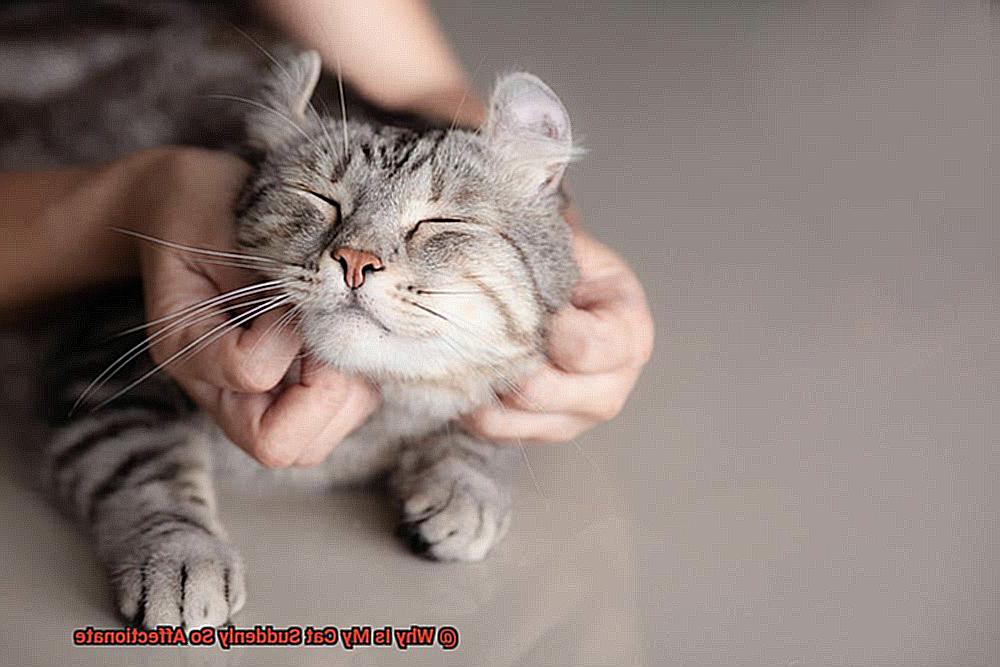
This could be due to a variety of factors, such as having a stable routine, access to food and water, and a clean litter box. So if your furry friend is suddenly snuggling up close and purring contentedly, it’s a sign that they’re feeling safe and comfortable in their surroundings.
But there’s more to it than just environmental factors. The bond that you share with your cat is also a key factor in their sudden displays of love.
Cats are social creatures and enjoy spending time with their owners. Regular playtime, grooming sessions, and cuddles can strengthen the bond between you and your feline friend, making them more likely to seek out your company and show affection.
Hormonal changes can also play a role in your cat’s behavior. Female cats may show more affection when they’re in heat, while male cats may become more cuddly after being neutered.
However, it’s important to keep up with regular veterinary check-ups to ensure that your cat’s hormones are in balance and that there are no underlying health issues causing their behavior.
So if you’re lucky enough to have a cat that suddenly wants to spend more time with you, consider it a positive sign.
Medical Issues That Could Cause Increased Affection
However, if you notice a sudden surge in your cat’s affectionate behavior, it could be a sign of an underlying medical issue that requires attention.
Cats are experts at masking their pain and discomfort, so an uptick in cuddles may be the only telltale symptom of an underlying health problem. One such medical condition that can cause increased affection is hyperthyroidism.
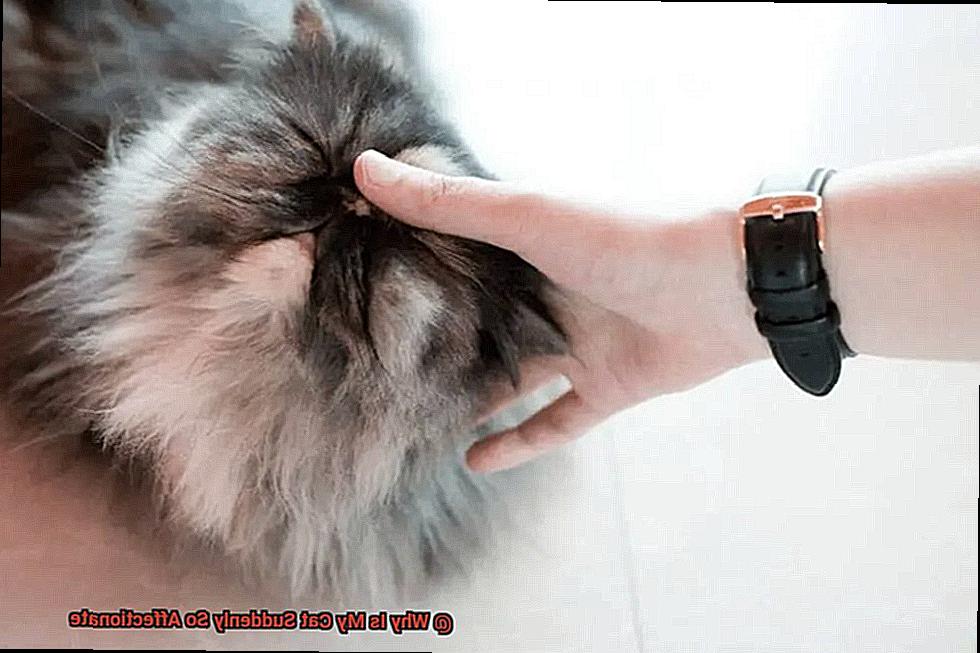
This occurs when the thyroid gland produces too much thyroid hormone, leading to weight loss, heightened activity levels, and an increase in vocalization and affection. Arthritis is another ailment that can trigger a sudden rise in affection.
This degenerative joint disease often causes pain and discomfort in cats, particularly as they age. Felines with arthritis may seek more physical contact as a way to alleviate their discomfort or as a response to feeling vulnerable due to their reduced mobility.
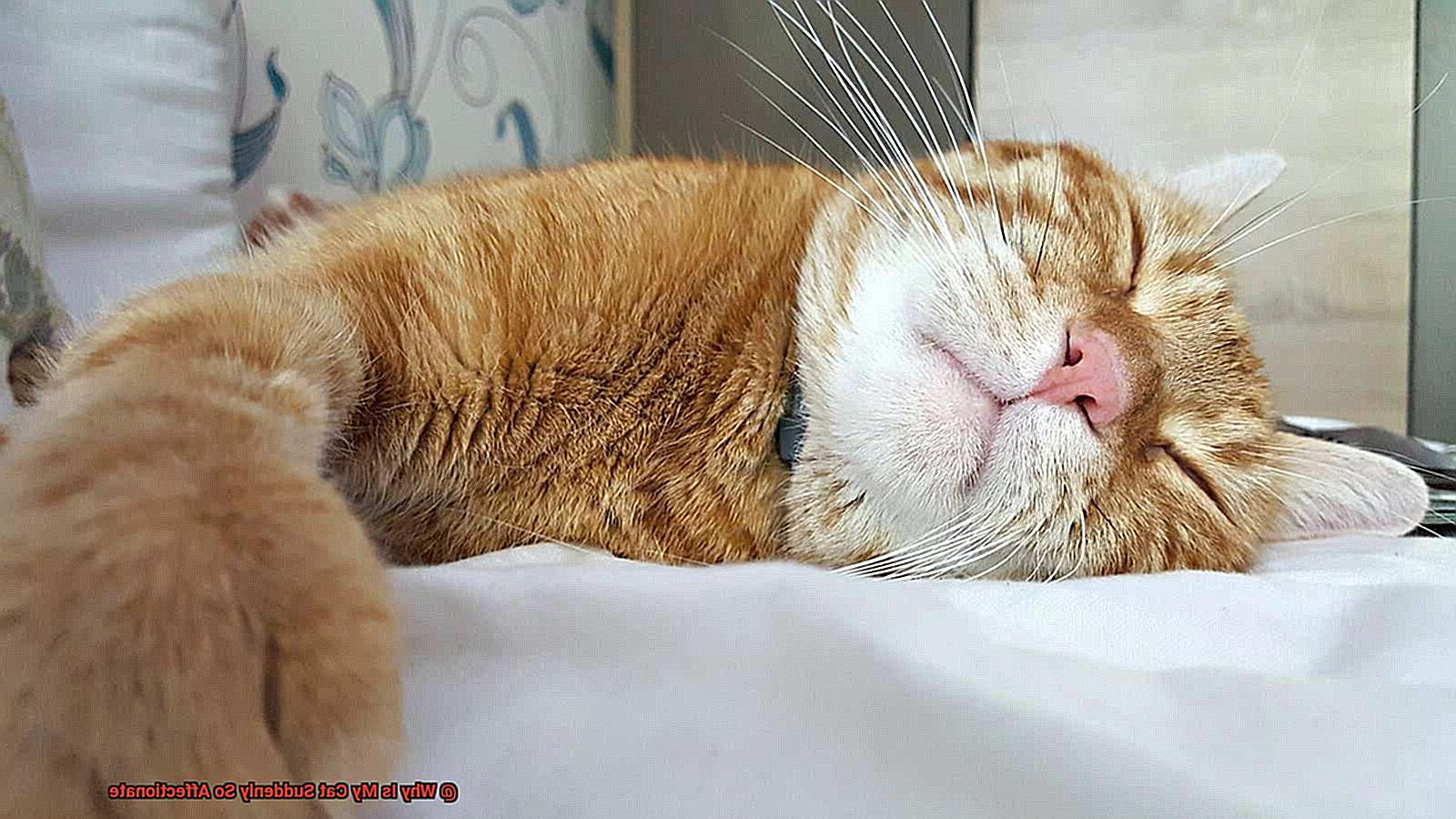
Neurological conditions such as feline dementia or cognitive dysfunction syndrome can also provoke cats to become more affectionate. These conditions may produce confusion, disorientation, and anxiety, prompting cats to seek out more physical contact and reassurance from their owners.
Your vet can help dismiss any underlying medical issues and provide appropriate treatment if necessary.
Changes in the Household or Routine
While this may seem like a pleasant change, it’s crucial to understand that changes in the household or routine can be a significant factor in your cat’s behavior.
Cats are creatures of habit and routine, and any disruption to their environment can cause stress or anxiety. For instance, the addition of a new pet or family member can trigger your cat, making them feel territorial and insecure.
Similarly, any changes in your daily routine such as starting a new job or working longer hours can leave your cat feeling lonely and craving attention. Moreover, any recent changes in your home environment such as moving to a new house or rearranging furniture can also be stressful for your feline friend.
They rely on familiarity and routine for their sense of security, so significant changes in their environment can leave them feeling unsettled and vulnerable. It’s essential to keep in mind that each cat has its unique personality, and they may respond differently to changes in the household or routine.
Some cats may become more withdrawn or reclusive, while others may become more vocal or even destructive. As a responsible pet owner, it’s crucial to recognize the signs that your cat is experiencing stress or anxiety due to changes in the household or routine.
Pay attention to their behavior and provide them with comfort and reassurance during these times of transition. Spending quality time with them, providing plenty of toys and stimulation, and creating a safe and secure environment can all help your cat adjust to these changes.
So, if you notice that your cat is suddenly becoming more affectionate than usual, it could be due to changes in the household or routine causing them stress or anxiety.
Signs of Stress or Anxiety in Cats
However, when they display unusual behaviors like sudden affection, it could be a sign of underlying stress or anxiety.
It’s crucial for cat owners to recognize these signs and take action to help their furry friends feel comfortable and relaxed. One of the most common signs of stress or anxiety in cats is excessive grooming.
If you notice that your cat is licking or grooming themselves to the point of creating bald spots, this could be a red flag. Another behavior that cats may exhibit when they’re feeling anxious or stressed is hiding.
They may retreat to a quiet corner or under the bed to avoid any potential stressors. If your cat suddenly stops eating or shows little interest in food, this could be a sign that they’re feeling overwhelmed or anxious.
Lethargy is another symptom that can indicate stress in cats. If your cat seems uninterested in playing or interacting with you, it could be due to underlying stress or anxiety.
Increased vocalization is another sign of stress or anxiety in cats. If your cat starts meowing more than usual or makes unusual noises, it could be a sign that they’re feeling stressed out.

On the other hand, sudden affection might indicate that your cat is seeking comfort and reducing their stress levels. It’s essential to keep in mind that not all cats display the same signs of stress or anxiety.
Some may become aggressive or destructive, while others may become withdrawn and aloof. Therefore, cat owners must pay attention to their feline friend’s behavior and monitor any changes that may indicate underlying stress.
Addressing the underlying cause of stress or anxiety can improve your cat’s overall well-being and strengthen the bond between you and your furry friend.
How to Ensure Your Cat Feels Secure and Loved
Provide a Safe Haven for Your Cat
Cats need a safe and secure environment where they can retreat to when they feel threatened. Ensure your home has enough hiding spots like cat trees, cardboard boxes or tunnels where your cat can relax without feeling exposed. Cats also need a comfortable bed, clean litter box, and plenty of toys to play with.
Regular Playtime
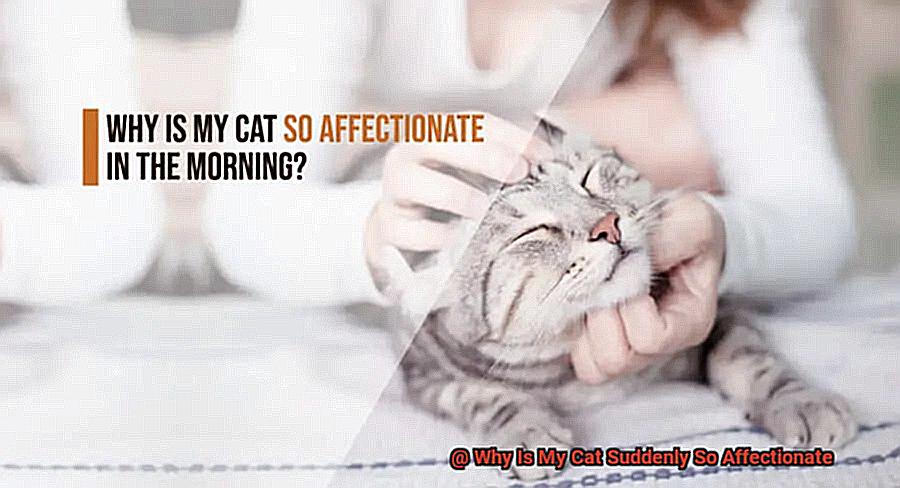
Play is an important aspect of a cat’s life, and it helps them bond with their owners. Set aside time every day to play with your cat using toys such as feather wands or laser pointers. This will not only strengthen your bond but also provide them with physical exercise and mental stimulation.
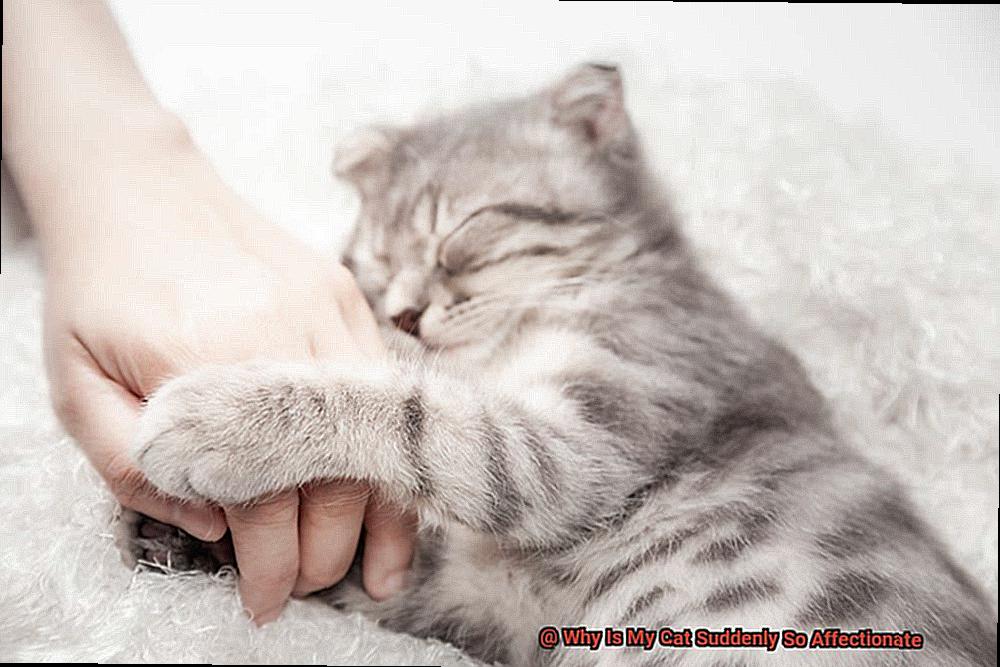
Consistent Routine
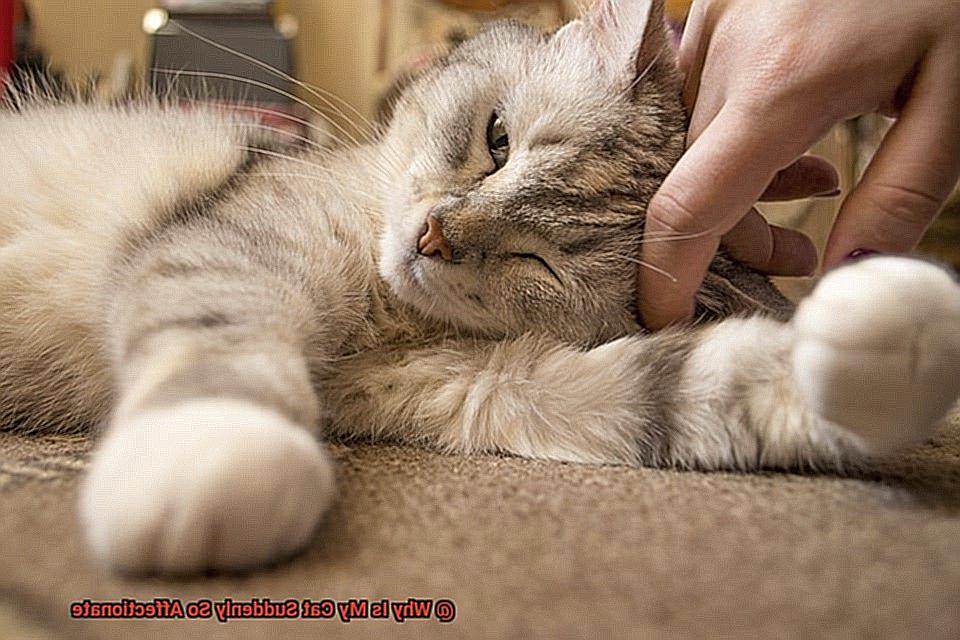
Cats thrive on routine, and any disruption can cause anxiety and stress. Ensure that you feed them at the same time every day and set up a regular playtime schedule. Establishing a routine will help your cat feel more comfortable in their environment, reduce stress, and increase their sense of security.
Show Affection
Cats are social creatures and crave human attention. Spend quality time with your cat by petting, cuddling, or grooming them regularly. Talk to them softly or give them treats as positive reinforcement. By doing so, you are showing them that they are loved and valued members of the family.
Give Them Space to Explore
Cats are curious animals and enjoy exploring their surroundings. Provide them with different areas to climb on or hide in, such as scratching posts or cat trees. This will not only provide them with physical exercise but also help satisfy their natural instincts.
By following these tips, you can ensure that your cat feels secure, loved, and maintains their affectionate behavior towards you. Remember, cats are individuals and may have different preferences, so observe their behavior regularly to identify any changes that may require attention from a veterinarian.
How to Provide Extra Attention and Comfort to Your Cat
You know that felines can be aloof creatures. But when they suddenly become more affectionate, it’s a sign that they need some extra attention and comfort.
Here are some ways to give your furry friend the TLC they deserve.
Playtime
Cats love to play! It’s a great way to bond with your cat while also keeping them entertained and stimulated. Interactive toys like wands or laser pointers are excellent options for encouraging exercise and mental stimulation.
Try playing with your cat for a few minutes each day, and watch as they enjoy the interaction.
Grooming
Grooming is an essential part of keeping your cat healthy, but it can also be a bonding experience. Regular brushing helps to keep their coat shiny and tangle-free, but it also gives them a sense of comfort and relaxation.
Use a soft brush to gently groom your cat, paying attention to areas they enjoy being petted such as their chin and cheeks. Your cat will appreciate the extra love and care.
Cozy Spaces
Cats love warm and cozy spaces where they can curl up and relax. Providing a soft bed or cushion in a quiet corner of the house can give them a sense of security and comfort.
You can also add blankets or towels with your scent on them to help your cat feel even more at ease. A cozy spot will become their safe haven, where they feel relaxed and loved.
Quality Time
Spending quality time with your cat is vital for their well-being. Simply sitting with them, talking to them, or giving them some extra cuddles can go a long way in making them feel loved and appreciated.
Remember, cats are social creatures and need interaction with their humans to thrive. By spending quality time with your cat, you’re strengthening your bond and making them feel secure.
Treats
Treats are an excellent way to show your cat some extra love and affection, but make sure to give them in moderation. Overfeeding can lead to health problems, so choose treats that are healthy and nutritious.
Giving your cat a treat is a way to reward them for good behavior and make them feel special.
So, providing your cat with extra attention and comfort is an excellent way to strengthen the bond between you and your furry friend. By playing with them, grooming them, creating cozy spots for them, spending quality time with them, and giving them treats in moderation, you can ensure that your cat feels loved and cared for.
Conclusion
To sum it up, if you’ve noticed your cat is suddenly more affectionate than usual, there could be various reasons behind this change.
Understanding your feline’s behavior is crucial in comprehending their message. Cats express love in different ways, such as rubbing against your leg or head-butting you gently.
However, sudden changes in behavior can indicate underlying health or emotional issues. Changes in the household or routine can cause stress or anxiety in cats.
Therefore, providing a safe and secure environment where they can retreat when feeling threatened is essential. Regular playtime, consistent routines, grooming sessions, and cuddles are all ways to strengthen the bond between you and your furry friend.
It’s vital to keep an eye on any sudden surge in affectionate behavior as it could be a sign of an underlying medical issue that requires attention from a veterinarian. Hyperthyroidism, arthritis and neurological conditions such as feline dementia or cognitive dysfunction syndrome are some examples of ailments that can trigger sudden rises in affection.
Remember to observe their behavior regularly to identify any changes that require attention from a veterinarian.







